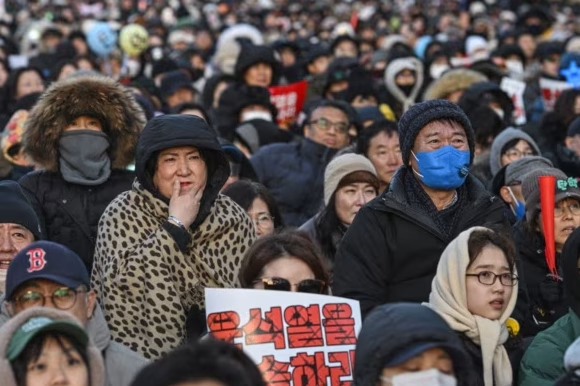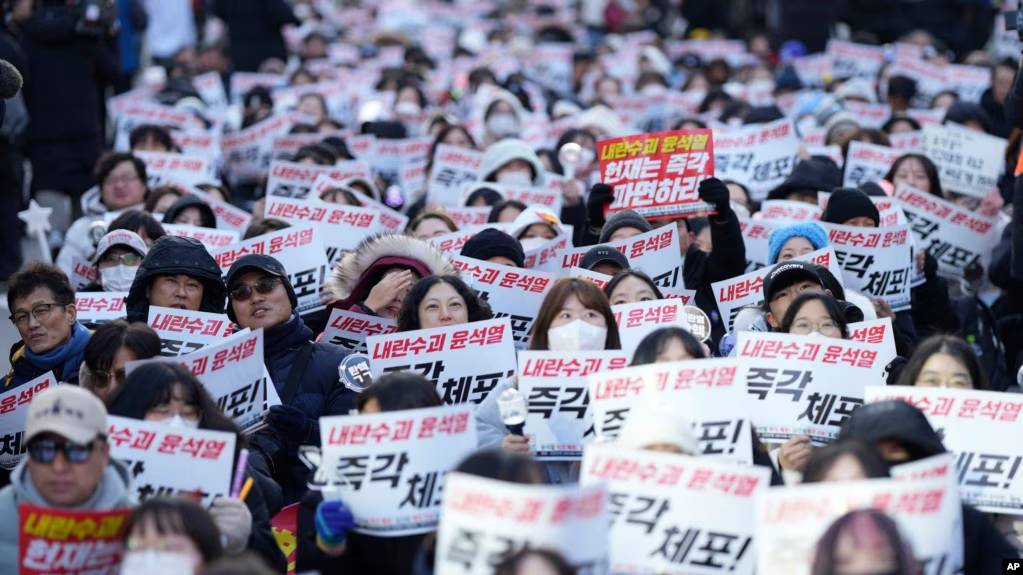SEOUL, SOUTH KOREA —
In a dramatic political turn, South Korean lawmakers have impeached President Yoon Suk Yeol over his controversial attempt to impose martial law. The impeachment, a high-stakes decision, now awaits review by the Constitutional Court to determine if Yoon will be permanently removed from office.
The vote, held on Saturday, saw 12 members of Yoon’s conservative People Power Party break ranks and join the opposition, leading to a decisive 204–85 result. Yoon’s presidential powers are now suspended, with Prime Minister Han Duck-soo stepping in as acting president until the court reaches its verdict.
The White House confirmed that U.S. President Joe Biden spoke with Han shortly after the vote, reaffirming the United States’ «ironclad commitment» to South Korea. Biden expressed confidence that the alliance between the two nations would remain pivotal for stability and prosperity in the Indo-Pacific region.

– «Foto Voz de América».
The Fallout
Yoon’s attempt to declare martial law on December 3 — the first since South Korea’s democratic transition in the 1980s — was swiftly overturned by lawmakers within hours. The move, widely condemned as unconstitutional, has left Yoon defending his actions as a “necessary message” against opposition lawmakers, whom he accused of obstructing his agenda and sympathizing with North Korea.
In a speech following the impeachment vote, Yoon struck a defiant tone.
«Although I am stopping for now, the journey I have walked with the people over the past 2½ years toward the future must never come to a halt. I will never give up,» he declared.
Outside the National Assembly, hundreds of thousands of protesters erupted in cheers as news of the impeachment spread.
“It’s about common sense versus nonsense,” said Lee Shin-mu, a 48-year-old Seoul resident attending the rally with his family. “I always believed impeachment would come if we gave it time.”
Legal Uncertainty
The Constitutional Court now has 180 days to deliberate, but the process is fraught with complications. Typically, six out of nine justices must vote to uphold impeachment. However, with three court seats vacant since October, a unanimous decision by the six remaining justices will be required for Yoon’s removal.
Daniel Pinkston, a professor at Troy University in Seoul, believes the court is likely to uphold the impeachment.
«Yoon clearly violated Article 77 of the constitution, which requires the president to notify the National Assembly immediately after declaring martial law,» Pinkston explained. He also pointed to allegations that Yoon instructed police and military forces to block lawmakers from convening during the crisis.
If the court upholds the impeachment, South Korea will need to hold a new presidential election within 60 days. Conversely, if Yoon is reinstated, he may still face criminal charges, including treason, as three separate government investigations are currently underway.
Uncertain Future for Han
Han Duck-soo, now acting president, finds himself in a precarious position. Opposition lawmakers are already considering his impeachment, citing his alleged involvement in Yoon’s martial law plan. Han denies complicity, stating that he «consistently opposed» the president’s efforts and pledging full cooperation with investigations.
A Nation at a Crossroads
For many South Koreans, the impeachment marks a critical juncture in the country’s democratic journey.
“Just as it took time to achieve impeachment, it will take perseverance to see it through,” said Lee Su-hyun, a 30-year-old protester in Seoul. “But if we keep raising our voices, we will eventually prevail.”
Yoon’s impeachment underscores the fragility of democratic institutions and raises questions about the balance of power in South Korea’s political system. Whether the court upholds the decision or reinstates Yoon, the events of recent weeks will leave a lasting mark on the nation’s history.
Descubre más desde Polimatía TemisEdu
Suscríbete y recibe las últimas entradas en tu correo electrónico.

